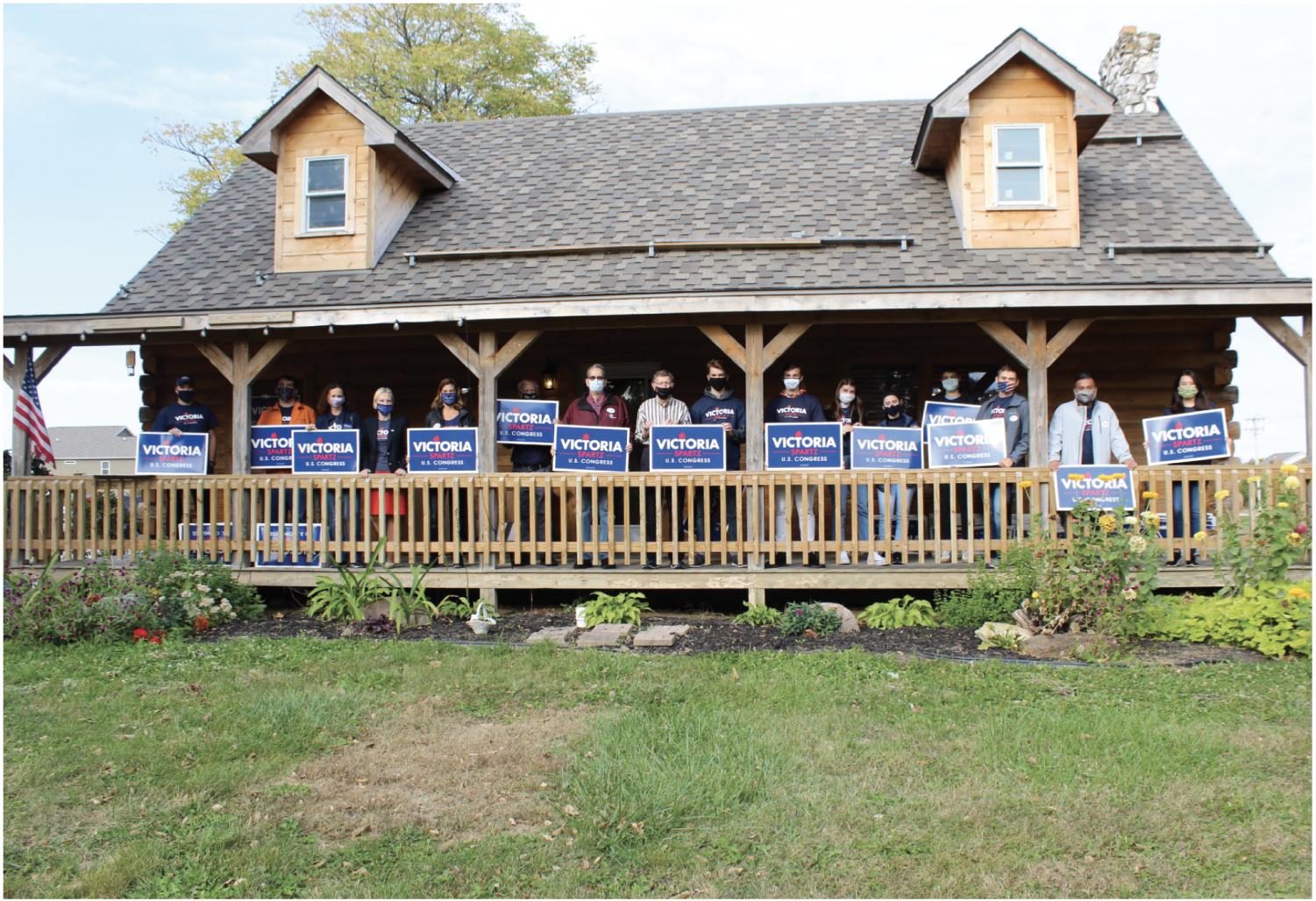Your donation will support the student journalists of Carmel High School - IN. Your contribution will allow us to purchase equipment and cover our annual website hosting costs.
Politicians, students advocate importance of teens in local politics
October 23, 2020
As the election gets closer, the bids for presidential candidates Donald Trump and Joe Biden come up in most everyday conversations. Debates between candidates have become heated as have debates between citizens. However, such debates often leave out the topic of local elections.
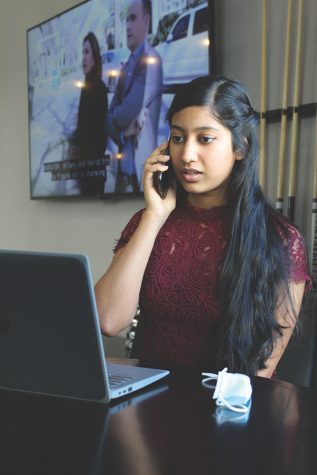
According to senior Caroline West, intern for the Hamilton County Republican Party and senior, local elections are of equal importance to the presidential one.
“Getting involved in local politics eventually opened my eyes to what’s going on locally and not just who’s running for president,” West said. “The congressional races started and I met (Republican) congresswoman (Susan) Brooks a few times, so that’s what opened my eyes to a few things locally. Then when I joined Carmel Republicans, that’s when I really took off in what I like to do.”
On Nov. 3, Indiana voters will select Democratic and Republican nominees for the 5th Congressional District in addition to other offices. Brooks, who served four terms, announced she would not run for reelection in the 2020 campaign, leaving an empty seat for Republicans and Democrats hoping to advance their careers. While Republicans chose Indiana state Sen. Victoria Spartz to fill the seat, Democrats chose former Indiana state Rep. Christina Hale. Click here to look at a graphic on the policies of Christina Hale and Victoria Spartz.
West said she has involved herself in politics since visiting a fundraising event for former congresswoman Susan Brooks. Since then, West has involved herself in local politics, including Carmel Republicans during her junior year and the November congressional race, by working for the Hamilton County GOP.
“(Working for the campaign has) shaped my perspective so much because you talk a lot about national politics or certain federal and national issues, but you don’t think about it locally with local schools and different infrastructure issues and other things that (we’ve been executing) locally. My mind has shifted from thinking about the big issues (to) thinking more about (smaller and more) local issues,” West said.
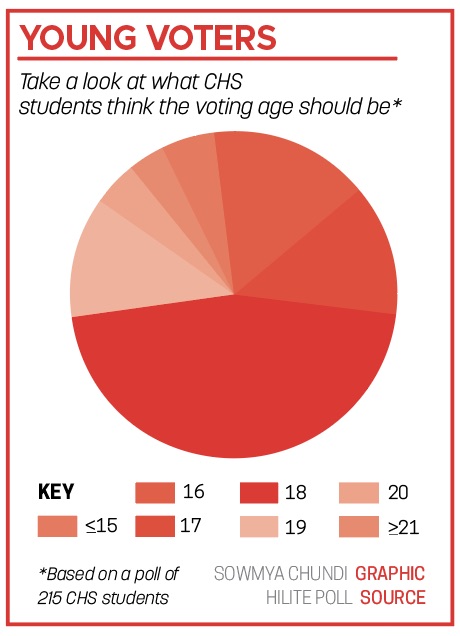
Local elections are not only important to West; according to Esha Sharma, deputy team captain for the Hale campaign and senior, while national elections are important, she said she thinks the 2020 congressional election is more worthy of her attention.
Sharma said, “I (joined) the Christina Hale campaign and I thought, ‘Okay, this is more important. This needs my attention right now’ because we’re so close to flipping the 5th (Congressional District from Republican majority to Democratic majority).”
Despite this, according to a 2016 study conducted by Portland State University analyzing 23 million voting records, less than 15% of eligible voters voted on local political offices such as mayors or council members.
Sharma said getting involved in elections could help close the gap and make a difference for the outcome of the election.
Sharma said, “There were a lot of people who I encountered who just said, ‘I don’t think that my involvement is necessary or that it can do anything,’ but it just becomes very apparent that one person can do so much if you just start exploring what your options can be, or (how by) entering into politics you can make a difference.”
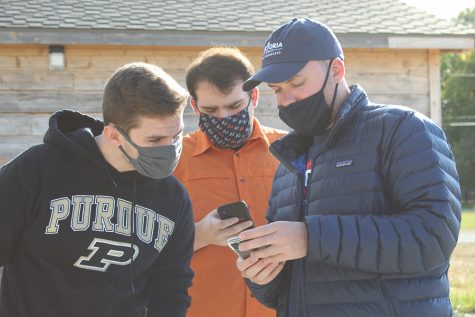
West said she agreed with Sharma on the importance of getting involved as the outcomes may be different from what one expects.
“You see people nationally (saying), ‘I’m going to vote for Trump, I’m going to vote for Biden,’ but learning about local issues and having people vote locally is really important,” West said.
Since COVID-19 spread throughout the nation, social distancing guidelines followed close behind, causing a shift in volunteer activities and events in politics. Organizers from both parties nationwide have canceled or postponed most fundraising events, including those focused on voter outreach and getting to know the candidates. However,
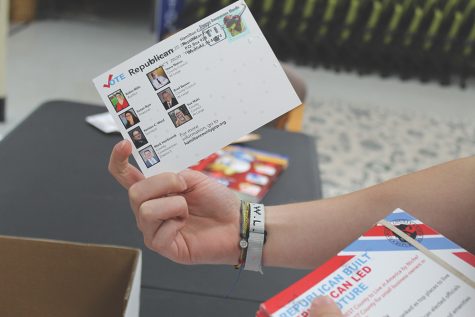
with the November elections still approaching, both Indiana congressional parties are still seeking to promote their candidates, though the means they are going about it differ.
According to Sharma, the Hale campaign has gone fully virtual with weekly meetings.
“With the way our structure is set up, you have so many points of contact where you can just talk to people,” Sharma said. “We have so many mentors where, whether it’s about our work or just about our lives, you can have a conversation (with them). I really do feel like I can text any of them and say, ‘Hey, can I call you really quickly? I have a question,’ and they would be okay with that.”
In contrast, West said the Hamilton County GOP is going door-to-door promoting the Republican candidates, including Spartz.
“I do a lot of door knocking, so I’ll do 100 or so houses if I’m by myself, and I’ll do 200 or so if I’m with someone else. It’s been really interesting learning about different people at their houses. It’s a really cool experience, just being able to talk to people and encountering different kinds of people. Some people are mad that you’re at their door, and some people are so excited to talk to you.” Click here to read a Q&A with the presidents of Young Democrats and Carmel Republicans on how they help congressional elections like Sharma and West.
According to Spartz, internships like West’s and Sharma’s are a great way for students to get involved with politics before they can vote or run for office.
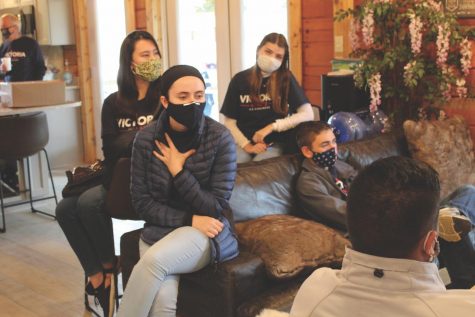
Spartz said via email, “Not only do you get to learn about campaigning and the political process, but you start to create a network of others involved in politics. That network is important to finding their next opportunities.”
Sharma said one of the most impactful moments during her internship was a phone call with a potential voter that lasted 20 minutes. During the call, they discussed controversial topics and their potential impact.
“He talked a lot about his own personal life and how these issues affect him, how gun control affects him and how healthcare affects him,” she said. “I guess I always thought of these terms as very abstract because I wasn’t necessarily, in terms of healthcare… directly affected by it… Talking to people is more eye-opening because I can see how these issues might affect them differently then it affects me.”
Spartz said that for her, working with publications and creating TV ads takes up most of her days on the campaign trail and leaves her busy.
According to West, her experience helped her more than one way.
West said, “I’ve finally found my passion (through the internship), so I’d just encourage anyone who the slightest bit is interested in politics, one way or the other, left or right—just get involved and start phone banking, start door knocking, and it’s the best thing ever, connecting with voters,” West said. “I think in school I’ve noticed when I’m talking about things, I’ve just become so much more knowledgeable about different issues, so it definitely helps you in school and in life, being so knowledgeable about local things.”
James Ziegler, Young Democrats club sponsor and social studies teacher said he agreed with West about the importance of teenage involvement in politics.
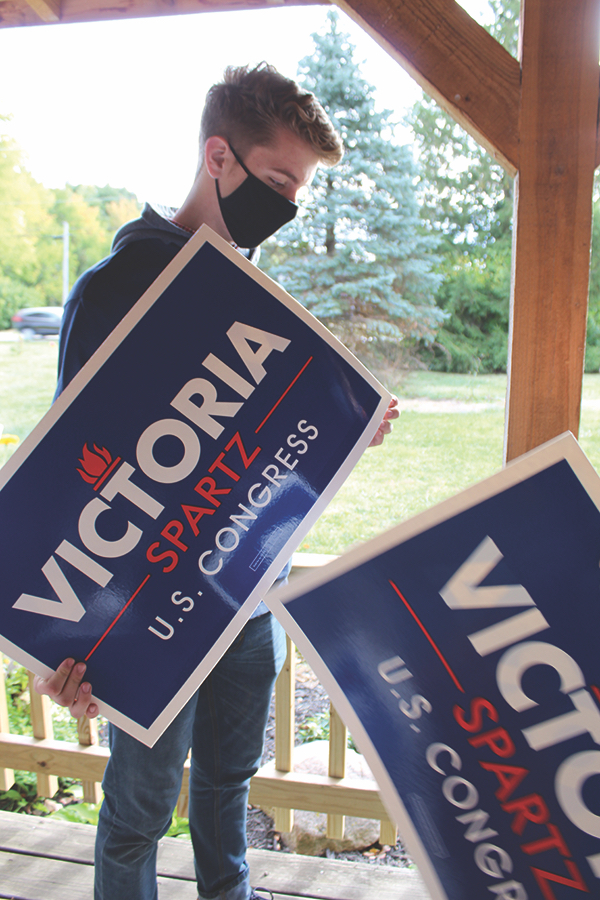
“It is critical for teenagers to get involved in politics even if they can’t vote,” Ziegler said via email. “Youth may not be able to vote; however, they are still greatly impacted by the decisions made by those in positions of power. Many of the decisions that our politicians make today have long-term impacts that will continue to impact youth for years to come. Because today’s youth will feel the repercussions of these decisions for years to come, it is essential that they let their voice and views be heard, especially on issues where there are large differences in perspectives between younger and older generations.”
Sharma said students should get involved in politics, both local and federal, regardless of whether every issue affects them personally.
“If you know what your beliefs are, you should find a way to stand up for them,” Sharma said. “Saying that ‘this isn’t my issue’ or ‘I’m not political’ just means that you’re political in favor of whoever is already in power.”
Spartz said her interns call and knock on the doors of various voters.
“They talk to hundreds of voters a day explaining how they are supporting my race for Congress and why the voter should as well,” Spartz said.
According to West, her experience has changed her perspective not only about Republicans, but about Democrats as well. She said her experience has also helped her become a more compassionate person.
“I definitely encourage people to join local clubs here and get involved in local politics because that can boost you in so many ways, and I’ve already seen (those) opportunities now,” West said. “Here I am in Hamilton County, but I got this opportunity for Indiana and then someone is connecting me to someone else who works in (Washington) D.C. for the RNC (Republican National Committee). Politics, you think it’s huge, but in reality it’s kind of a small world. In Carmel, we’re so special because we have so many great people who are working in (Washington) D.C. right now and Congress who are from Indiana.”
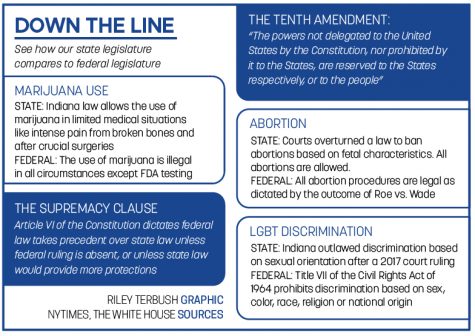
Sharma said that she agreed with West, saying there are many ways to get involved in politics, especially given the various clubs offered at this school.
Sharma said, “I would say that first and foremost is to try to get involved in whatever way you can, whether it’s the smallest thing; if you just volunteer for half an hour to do a phone banking shift, that’s important. If you completely commit to joining a campaign, that’s also important. I think its important to not remain apathetic and also not to remain completely discouraged, because there’s always a way to move forward. That sounds so cliché, but it’s true.”
Editors’ Note: Reporters reached out to additional members of the Christina Hale campaign during the writing of this story but were unable to interview them. Additionally, photographers made efforts to take photos of the Hale campaign, but given the socially distanced, all-virtual strategy of voter outreach these shots were not as possible in contrast to Spartz’s more traditional campaign strategy. Any comments made by interns do not necessarily reflect the views of their candidates or that of the HiLite Staff.
